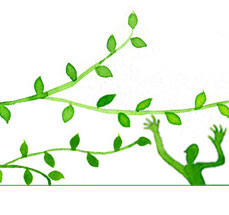로마서 Lesson 9: Romans 2020(7:1-25) Paul's sigh and thanks
페이지 정보

본문
Lesson 9: Romans 2020
Word | Romans 7:1:1-25
Key verse | Romans 7:24,25
Paul’s sigh and thanks
"24 What a wretched man I am! Who will rescue me from this body that is subject to death? 25 Thanks be to God, who delivers me through Jesus Christ our Lord!"
Last week, we learned that since we were saved, we should come to holiness as servants of righteousness. Today we are dealing with the role of the law. In the life of the law, you get tired and sigh in grief, because you cannot keep the law. The conflict that follows the law is dealt with in Chapter 7, and Chapter 8 deals with the life under the guidance of the Holy Spirit. Through the law, you must discover yourself as a sinner and feel keenly the necessity of knowing Christ. We find trouble in understanding the eternal triangle of law, sin, and ‘me’. Therefore, we need a new life in a new area. Only by faith we can be righteous; and by gratitude for the grace of salvation we can obey the word of God. You will live a life of achieving the law when you live under the reign and guidance of Holy Spirit. I pray that you will have a profound understanding of the role of the law and the conflict within it and live in faith till the end.
Apostle Paul speaks to his brothers who know the law. The law governs a person only while he lives. Even if you are sued and tried, it's all over if you die. If you die, you are excluded from prosecution. The law cannot claim us, since we die with Jesus. As what 6:14 said, those who are justified by faith are not under the law, but under grace, and sin cannot assert us. Apostle Paul explains it by giving an example about marriage.
Look verses 2 and 3. “2 For example, by law a married woman is bound to her husband as long as he is alive, but if her husband dies, she is released from the law that binds her to him. 3 So then, if she has sexual relations with another man while her husband is still alive, she is called an adulteress. But if her husband dies, she is released from that law and is not an adulteress if she marries another man.” A married woman is bound by law when her husband is alive. Husband, Mr. Law, apparently has moderation and a life of the example. He cleans the room neatly and after eating, the dishes in the kitchen are always shiny for he thoroughly washes the dishes. He also exercises thoroughly that he always lives in a healthy state. However, the problem is that Mr. Law requires this kind of life for his wife. If his wife is tired and leaves the house messy, ignores the piles of dishes on the sink, or does not prepare meals, arrows of judgment and sin come to her. She tried hard to please her husband, but it was killing her to live up to that standard. No matter how hard she tried to wash the dishes, her husband examined the dishes, found what had not been cleaned, and judged her. She was afraid to see her husband frowning if she does not clean because of being tired and exhausted. Then, if her husband dies, the woman is sad on the outside, but sings of cheerfulness inside. "Now I'm free!" When husband dies, the wife is free from the law and even if she marries to another man, she does not become a prostitute.
Therefore, we believers should unite with Jesus and bear fruit for God, because we were killed under the law by the body of Christ and given a new life. The law does not die. Instead, we died with Christ and got a new life. We must go with Jesus, who became a groom, unite with him, and bear fruit for God. Jesus does not turn off a dying wick or break a bad reed. He makes the wick shine; he fixes the broken reed and makes it useful. Jesus is full of grace and truth. He gives rest to all who work hard and bear heavy burdens. By uniting with Jesus we bear fruit of life, fruit of Holy Spirit.
For when we were in the realm of the flesh, the sinful passions aroused by the law were at work in us, so that we bore fruit for death. By doing what the law says not to do, we continue to sin and die for wage. But now, by dying to what once bound us, we have been released from the law; so that we serve in the new way of the Spirit, and not in the old way of the written code. The new way of the Spirit is life that leads to sanctity along the guidance of the Holy Spirit. The Holy Spirit teaches and guides us as spirits of truth. The Holy Spirit is not an old way of the written code, but a reminder of what the spirit of the law is. The Holy Spirit not only makes us believe in Jesus and be reborn, but also lets us serve Him in a new way. In other words, It pours out the love of God and makes us serve the Lord with full grace. It's easy to get old, formalized and hardened, if we don't always be in a new way. When we find ourselves in words of God and repent, we can resemble God's holiness every day as a new man. The law is holy. The law provides a goal to run for to the believer, who is reborn. We serve God by the ability of the Holy Spirit and by the power of grace. The Holy Spirit understands each person's situation and reality, and guides them accordingly. I pray for God will always allow the fire of the Holy Spirit be with us and help us strongly serve the Lord.
Paul takes verse 5 and explains the law from verse 7. Through his experience, he explains that the law is holy, not a sin. See verses 7 and 8. "7 What shall we say, then? Is the law sinful? Certainly not! Nevertheless, I would not have known what sin was had it not been for the law. For I would not have known what coveting really was if the law had not said, “You shall not covet.” 8 But sin, seizing the opportunity afforded by the commandment, produced in me every kind of coveting. For apart from the law, sin was dead." The law tells us what we deserve to do, but it does not free us from sin. The law provides the right direction, but it does not give the power to do it. The more you keep the law, the more you are bound by sin. For example, we make a commitment to keep attending the Sunday service in time, but after a month or two, we come late again and get distracted. And we get to repeat the words: "Be punctual." Then it becomes a commotion with arguments like: whether this is the law or not, or shouldn’t this be done with grace. Then is the law a bad thing? No, the law itself is holy. If there is no law, we sin without knowing what sin is. "You shall not covet" is the tenth commandment in the Ten Commandments. “Coveting” is an excessive greed. In the past, greed was not considered a sin. Many envied and praised greedy people, because they thought they could do nothing without greed. However, the Bible says that excessive greed is a sin. For instance, before we believed in Jesus, we did not think it was a sin to seek our own glory not seeking God's glory. We took it for granted that we should seek our own glory. And we didn't think complacency and laziness were a sin. We thought it was happiness to live faithfully in ‘my’ nature. But since the law stipulates that it is a sin, we realized that it is a sin. What happened when you realized your sin like this way? See verses 9 and 10. "9 Once I was alive apart from the law; but when the commandment came, sin sprang to life and I died. 10 I found that the very commandment that was intended to bring life actually brought death."
Originally, the purpose of the law given by God was to lead the Israelites, who were slaves, to the path of righteousness and let them live as people of God. However the commandment, which should lead people to life by sin, led them to death. The wages of sin is death. The more the law is engraved in our consciousness, the more sin appears in action. The law itself cannot suppress or cure sin. So Paul said that it leads us to death. This is called a trick, because the more you recognize the commandment, the farther you are away from life, but closer to death. "11 For sin, seizing the opportunity afforded by the commandment, deceived me, and through the commandment put me to death.”
Verse 12 is the conclusion of verses 7-11. "Wherefore the law is holy, and the commandment holy, and just, and good." Although the law has the function of providing opportunity for sin, it nevertheless leads to life. Therefore, the law is holy, righteous and good. The law reflects the nature of God and reveals his integrity.
Paul now explains his relationship with law and sin. See verse 13. “Did that which is good, then, become death to me? By no means! Nevertheless, in order that sin might be recognized as sin, it used what is good to bring about my death, so that through the commandment sin might become utterly sinful.” The commandment makes sin manifest itself as sin and it causes sin to be utterly sinful. The law brings us to Jesus by making us realize our sins. Through the law we are able to live in repentance, and the grace will graced.
See verse 14 and 15. “We know that the law is spiritual; but I am unspiritual, sold as a slave to sin. I do not understand what I do. For what I want to do I do not do, but what I hate I do.” Paul confesses that he does not do what he wants, but does what he hates. So he doesn’t understand himself. This makes him realize that he is unspiritual and sold as slave under sin. Now he confesses that it is not he who does it, but sin that dwells in him. He knows that the good itself does not dwell in him. Paul has the desire to do what is good, however, he cannot carry it out. He does not do what he wants which is good, but he does evil which he does not desire. Paul also confesses that now if he does what he does not desire to do, it is no longer Paul who does it, but the sin living in him. Here we can know that Paul sees the true nature of sin. Humans are totally corrupt and incapable of doing good. That is why we need salvation from the outer. We do not have the ability to bring ourselves to salvation with our own strength.
See verses 22 and 23. “For in my inner being I delight in God’s law; but I see another law at work in me, waging war against the law of my mind and making me a prisoner of the law of sin at work within me.” Paul talks about the two struggles in him. The inner person rejoices in the law of God, but the another law that is working in Paul is fighting with the law of his heart. The result of that fight is the victory of sin. The law of sin grips us as if the gravity pulls all the objects even though we throw them upwards several times, a hundred times, and a thousand times. This causes our souls to lament.
See verse 24. “What a wretched man I am! Who will rescue me from this body that is subject to death?” This verse is the lament of all, who dwells in world of sin and law. There is no exception, whether Jewish or non-Jew. In Israel's history, prophets were sent in order to let others obey to the commandment, but they disobeyed and worshiped idols, eventually leading to the collapse of the nation. Although they wanted to keep the law thoroughly after the return from Babylon, they lived a life like a grave, as Jesus pointed out. We are able to see at the speck of sawdust in other people, but cannot see the plank in our own eye. Humans are inconsistent masses. We are not entitled to judge in equality, without exception. We live in sin, not keeping the law. It’s six of one and half a dozen of the other.
Let’s read verse 25 altogether. “Thanks to God, who delivers me through Jesus Christ our Lord! So then, I myself in my mind am a slave to God’s law, but in my sinful nature a slave to the law of sin.” Apostle Paul suddenly thanks God for the shriek of people living under the world of sin and law. He was able to sigh deeply in relief through the salvation of Jesus Christ from struggling in depths of the death. In despaired situation, he looked upon to Jesus, the Savior. We have been justified through faith by Jesus Christ and we should be thankful for living under the guidance of the Holy Spirit. This shows us about what kind of shrieking people are human beings in the world of sin and law.
One day we’ll be completely free from sin. Until then, we need to serve God’s Law with our heart, but our body will not listen and serve the law of sin. Then does it mean that we will live as a failure from sin? Absolutely not. Not only we ultimately win through Jesus Christ, but we can live a victorious life in this world. We can achieve victory in the law of the Holy Spirit of life, because it overwhelms the forces of sin. From Chapter 8 we will see the blessed life of Christian living under the law of the Holy Spirit of life.
From today’s words, we discovered about the new form of human. It is obvious that we can find sin in sinners. This is not strange. We don’t have to be disappointed discovering sins in ourselves. We all are sinners and need a savior. The problem is that when we find these sins in Christians, our expectations may fall. As Christian we may think that we are spiritually matured, but when we figure out that we have sin in ourselves, we can easily get disappointed and discouraged. But we shouldn’t be disappointed. We have to look at Jesus. Jesus is our only hope and salvation. We believe in Jesus and serve Him passionately, when we are fulfilled with grace. If the state of grace is low, we will set the rules and restore the grace in a legal manner. The struggles due to law make people exhausted and despaired. We are not justified by obeying the law, but we who have already been saved will maintain the law with gratitude in order to live like the people of God. It is not the outer appearance of the law, but the spirit of God, the love of the neighbor, to fulfill the law. To do this we must repent, receive forgiveness of sins, and be fulfilled with the Holy Spirit every time. If it is hard, you should rest. By keeping the law we are not justified, but by faith in Jesus, only by the blood of Jesus we become justified. I pray for the grace of salvation and live by faith from beginning to end. We praise for our Savior, Jesus.
Word | Romans 7:1:1-25
Key verse | Romans 7:24,25
Paul’s sigh and thanks
"24 What a wretched man I am! Who will rescue me from this body that is subject to death? 25 Thanks be to God, who delivers me through Jesus Christ our Lord!"
Last week, we learned that since we were saved, we should come to holiness as servants of righteousness. Today we are dealing with the role of the law. In the life of the law, you get tired and sigh in grief, because you cannot keep the law. The conflict that follows the law is dealt with in Chapter 7, and Chapter 8 deals with the life under the guidance of the Holy Spirit. Through the law, you must discover yourself as a sinner and feel keenly the necessity of knowing Christ. We find trouble in understanding the eternal triangle of law, sin, and ‘me’. Therefore, we need a new life in a new area. Only by faith we can be righteous; and by gratitude for the grace of salvation we can obey the word of God. You will live a life of achieving the law when you live under the reign and guidance of Holy Spirit. I pray that you will have a profound understanding of the role of the law and the conflict within it and live in faith till the end.
Apostle Paul speaks to his brothers who know the law. The law governs a person only while he lives. Even if you are sued and tried, it's all over if you die. If you die, you are excluded from prosecution. The law cannot claim us, since we die with Jesus. As what 6:14 said, those who are justified by faith are not under the law, but under grace, and sin cannot assert us. Apostle Paul explains it by giving an example about marriage.
Look verses 2 and 3. “2 For example, by law a married woman is bound to her husband as long as he is alive, but if her husband dies, she is released from the law that binds her to him. 3 So then, if she has sexual relations with another man while her husband is still alive, she is called an adulteress. But if her husband dies, she is released from that law and is not an adulteress if she marries another man.” A married woman is bound by law when her husband is alive. Husband, Mr. Law, apparently has moderation and a life of the example. He cleans the room neatly and after eating, the dishes in the kitchen are always shiny for he thoroughly washes the dishes. He also exercises thoroughly that he always lives in a healthy state. However, the problem is that Mr. Law requires this kind of life for his wife. If his wife is tired and leaves the house messy, ignores the piles of dishes on the sink, or does not prepare meals, arrows of judgment and sin come to her. She tried hard to please her husband, but it was killing her to live up to that standard. No matter how hard she tried to wash the dishes, her husband examined the dishes, found what had not been cleaned, and judged her. She was afraid to see her husband frowning if she does not clean because of being tired and exhausted. Then, if her husband dies, the woman is sad on the outside, but sings of cheerfulness inside. "Now I'm free!" When husband dies, the wife is free from the law and even if she marries to another man, she does not become a prostitute.
Therefore, we believers should unite with Jesus and bear fruit for God, because we were killed under the law by the body of Christ and given a new life. The law does not die. Instead, we died with Christ and got a new life. We must go with Jesus, who became a groom, unite with him, and bear fruit for God. Jesus does not turn off a dying wick or break a bad reed. He makes the wick shine; he fixes the broken reed and makes it useful. Jesus is full of grace and truth. He gives rest to all who work hard and bear heavy burdens. By uniting with Jesus we bear fruit of life, fruit of Holy Spirit.
For when we were in the realm of the flesh, the sinful passions aroused by the law were at work in us, so that we bore fruit for death. By doing what the law says not to do, we continue to sin and die for wage. But now, by dying to what once bound us, we have been released from the law; so that we serve in the new way of the Spirit, and not in the old way of the written code. The new way of the Spirit is life that leads to sanctity along the guidance of the Holy Spirit. The Holy Spirit teaches and guides us as spirits of truth. The Holy Spirit is not an old way of the written code, but a reminder of what the spirit of the law is. The Holy Spirit not only makes us believe in Jesus and be reborn, but also lets us serve Him in a new way. In other words, It pours out the love of God and makes us serve the Lord with full grace. It's easy to get old, formalized and hardened, if we don't always be in a new way. When we find ourselves in words of God and repent, we can resemble God's holiness every day as a new man. The law is holy. The law provides a goal to run for to the believer, who is reborn. We serve God by the ability of the Holy Spirit and by the power of grace. The Holy Spirit understands each person's situation and reality, and guides them accordingly. I pray for God will always allow the fire of the Holy Spirit be with us and help us strongly serve the Lord.
Paul takes verse 5 and explains the law from verse 7. Through his experience, he explains that the law is holy, not a sin. See verses 7 and 8. "7 What shall we say, then? Is the law sinful? Certainly not! Nevertheless, I would not have known what sin was had it not been for the law. For I would not have known what coveting really was if the law had not said, “You shall not covet.” 8 But sin, seizing the opportunity afforded by the commandment, produced in me every kind of coveting. For apart from the law, sin was dead." The law tells us what we deserve to do, but it does not free us from sin. The law provides the right direction, but it does not give the power to do it. The more you keep the law, the more you are bound by sin. For example, we make a commitment to keep attending the Sunday service in time, but after a month or two, we come late again and get distracted. And we get to repeat the words: "Be punctual." Then it becomes a commotion with arguments like: whether this is the law or not, or shouldn’t this be done with grace. Then is the law a bad thing? No, the law itself is holy. If there is no law, we sin without knowing what sin is. "You shall not covet" is the tenth commandment in the Ten Commandments. “Coveting” is an excessive greed. In the past, greed was not considered a sin. Many envied and praised greedy people, because they thought they could do nothing without greed. However, the Bible says that excessive greed is a sin. For instance, before we believed in Jesus, we did not think it was a sin to seek our own glory not seeking God's glory. We took it for granted that we should seek our own glory. And we didn't think complacency and laziness were a sin. We thought it was happiness to live faithfully in ‘my’ nature. But since the law stipulates that it is a sin, we realized that it is a sin. What happened when you realized your sin like this way? See verses 9 and 10. "9 Once I was alive apart from the law; but when the commandment came, sin sprang to life and I died. 10 I found that the very commandment that was intended to bring life actually brought death."
Originally, the purpose of the law given by God was to lead the Israelites, who were slaves, to the path of righteousness and let them live as people of God. However the commandment, which should lead people to life by sin, led them to death. The wages of sin is death. The more the law is engraved in our consciousness, the more sin appears in action. The law itself cannot suppress or cure sin. So Paul said that it leads us to death. This is called a trick, because the more you recognize the commandment, the farther you are away from life, but closer to death. "11 For sin, seizing the opportunity afforded by the commandment, deceived me, and through the commandment put me to death.”
Verse 12 is the conclusion of verses 7-11. "Wherefore the law is holy, and the commandment holy, and just, and good." Although the law has the function of providing opportunity for sin, it nevertheless leads to life. Therefore, the law is holy, righteous and good. The law reflects the nature of God and reveals his integrity.
Paul now explains his relationship with law and sin. See verse 13. “Did that which is good, then, become death to me? By no means! Nevertheless, in order that sin might be recognized as sin, it used what is good to bring about my death, so that through the commandment sin might become utterly sinful.” The commandment makes sin manifest itself as sin and it causes sin to be utterly sinful. The law brings us to Jesus by making us realize our sins. Through the law we are able to live in repentance, and the grace will graced.
See verse 14 and 15. “We know that the law is spiritual; but I am unspiritual, sold as a slave to sin. I do not understand what I do. For what I want to do I do not do, but what I hate I do.” Paul confesses that he does not do what he wants, but does what he hates. So he doesn’t understand himself. This makes him realize that he is unspiritual and sold as slave under sin. Now he confesses that it is not he who does it, but sin that dwells in him. He knows that the good itself does not dwell in him. Paul has the desire to do what is good, however, he cannot carry it out. He does not do what he wants which is good, but he does evil which he does not desire. Paul also confesses that now if he does what he does not desire to do, it is no longer Paul who does it, but the sin living in him. Here we can know that Paul sees the true nature of sin. Humans are totally corrupt and incapable of doing good. That is why we need salvation from the outer. We do not have the ability to bring ourselves to salvation with our own strength.
See verses 22 and 23. “For in my inner being I delight in God’s law; but I see another law at work in me, waging war against the law of my mind and making me a prisoner of the law of sin at work within me.” Paul talks about the two struggles in him. The inner person rejoices in the law of God, but the another law that is working in Paul is fighting with the law of his heart. The result of that fight is the victory of sin. The law of sin grips us as if the gravity pulls all the objects even though we throw them upwards several times, a hundred times, and a thousand times. This causes our souls to lament.
See verse 24. “What a wretched man I am! Who will rescue me from this body that is subject to death?” This verse is the lament of all, who dwells in world of sin and law. There is no exception, whether Jewish or non-Jew. In Israel's history, prophets were sent in order to let others obey to the commandment, but they disobeyed and worshiped idols, eventually leading to the collapse of the nation. Although they wanted to keep the law thoroughly after the return from Babylon, they lived a life like a grave, as Jesus pointed out. We are able to see at the speck of sawdust in other people, but cannot see the plank in our own eye. Humans are inconsistent masses. We are not entitled to judge in equality, without exception. We live in sin, not keeping the law. It’s six of one and half a dozen of the other.
Let’s read verse 25 altogether. “Thanks to God, who delivers me through Jesus Christ our Lord! So then, I myself in my mind am a slave to God’s law, but in my sinful nature a slave to the law of sin.” Apostle Paul suddenly thanks God for the shriek of people living under the world of sin and law. He was able to sigh deeply in relief through the salvation of Jesus Christ from struggling in depths of the death. In despaired situation, he looked upon to Jesus, the Savior. We have been justified through faith by Jesus Christ and we should be thankful for living under the guidance of the Holy Spirit. This shows us about what kind of shrieking people are human beings in the world of sin and law.
One day we’ll be completely free from sin. Until then, we need to serve God’s Law with our heart, but our body will not listen and serve the law of sin. Then does it mean that we will live as a failure from sin? Absolutely not. Not only we ultimately win through Jesus Christ, but we can live a victorious life in this world. We can achieve victory in the law of the Holy Spirit of life, because it overwhelms the forces of sin. From Chapter 8 we will see the blessed life of Christian living under the law of the Holy Spirit of life.
From today’s words, we discovered about the new form of human. It is obvious that we can find sin in sinners. This is not strange. We don’t have to be disappointed discovering sins in ourselves. We all are sinners and need a savior. The problem is that when we find these sins in Christians, our expectations may fall. As Christian we may think that we are spiritually matured, but when we figure out that we have sin in ourselves, we can easily get disappointed and discouraged. But we shouldn’t be disappointed. We have to look at Jesus. Jesus is our only hope and salvation. We believe in Jesus and serve Him passionately, when we are fulfilled with grace. If the state of grace is low, we will set the rules and restore the grace in a legal manner. The struggles due to law make people exhausted and despaired. We are not justified by obeying the law, but we who have already been saved will maintain the law with gratitude in order to live like the people of God. It is not the outer appearance of the law, but the spirit of God, the love of the neighbor, to fulfill the law. To do this we must repent, receive forgiveness of sins, and be fulfilled with the Holy Spirit every time. If it is hard, you should rest. By keeping the law we are not justified, but by faith in Jesus, only by the blood of Jesus we become justified. I pray for the grace of salvation and live by faith from beginning to end. We praise for our Savior, Jesus.
댓글목록
등록된 댓글이 없습니다.















